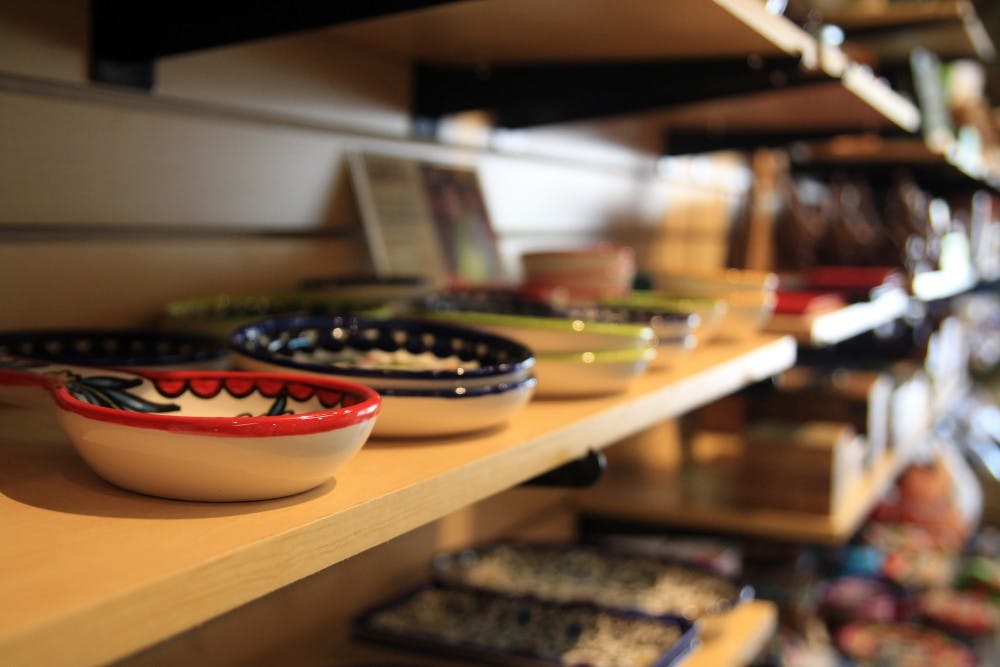Handmade goods from recycled and repurposed materials crowd the small space at 122 N. Walnut St. One wall displays journals handmade by Sri Lankans with pages made from post-consumer paper and elephant poop. A shelf is lined with colorful elephant statues Kenyan artists created from flip-flops.
Each of Global Gifts’ products has been made by artisans paid fair wages in safe working conditions. This Saturday, the nonprofit organization, which has four locations in Indiana and Ohio, marked its 30th year offering fair trade products. The Bloomington storefront celebrated its ninth year in business.
For many of its employees and volunteers, the store offers a chance to have a positive impact around the world.
“It’s something I can believe in,” executive director Alissa Head said.
To receive its fair trade designation, 85 percent of Global Gifts’ products must satisfy fair trade principles set by the World Fair Trade Organization. They typically carry more than 2,000 different products from around 230 individual artisan groups. The rest of their products — about 5 percent — are locally handmade goods, books or music.
The fair trade movement provides a market for producers who otherwise would not have means to export their products. Goods typically travel from the individual artisan to a cooperative, who sends a combined shipment to a Fair Trade importer that connects with retailers like Global Gifts.
Head said the incomes artisans receive through selling fair trade goods have allowed them to send their children to school, build a well for clean water and often avoid sex trafficking.
“We say dignity, not charity,” Head said.
Because of the Bloomington shop’s limited space, store manager Dave Debikey said they try to work with the most marginalized artisans, the vast majority of which are women. Other producers suffer from disabilities and diseases, or are refugees or indigineous people.
In 2013 Debikey traveled to meet artisans who create some products he sells. A woman referred to as Inaq Sugiani, whose husband produced cat ornaments Global Gifts formerly carried, particularly stood out to him.
She had learned silver work through a class offered by the cooperative she and her husband belonged to. She went on to design infinity-shaped earrings that became so popular her income surpassed her husband’s. He became her assistant.
“And suddenly, she was the boss," Debikey said. "She was the big bread winner, and she was just glowing with pride. That’s a very uncommon thing to take place.”
Global Gifts still sells Sugiani’s earrings, but no longer carries her husband’s wooden cats. It is unclear whether he stopped making them or whether his importer stopped carrying them.
The Bloomington store’s most popular category is jewelry, Debikey said. This summer, wind chimes and outdoor door bells were particularly successful, and scarves, bags and accessories are big.
“Headbands are so much bigger than scarves these days,” Debikey said. “And things like scrunchies are making a comeback.”
The Bloomington store opened in August 2009, right after the economy crashed. While many businesses shut their doors, Debikey said the community embraced Global Gifts.
“People were looking for some alternatives, and something different,” Debikey said.
By 2013, Bloomington vendors offered enough fair trade products to earn a fair trade town certification from Fair Trade Campaigns, a national promoter of the movement. Bloomington city council passed a resolution that year to extend the designation into a city policy of purchasing fair trade products when possible.
Debikey is the only full-time staff member of the Bloomington location. There are four part-time sales associates, but the store relies on volunteers to maintain their constantly changing inventory.
Compared to prices at big discount retail chains, fair trade goods might be more expensive, said Amanda Eby, a part-time sales associate who has worked in retail for more than 20 years. But the quality of a handmade product is incomparable to items sold at larger companies. And larger chains are subject to more administrative and storage costs.
“There’s not quite as many steps,” Eby said. “That’s a way you can kind of keep prices reasonable.”
Junior Molly Livingston, a Global Gifts volunteer, said the mission to give back to developing countries, combined with the quality of a handmade product, typically leads customers to calmly understand prices that might be higher than they can afford.
“You never feel like you’re paying too much for something,” Livingston said.
People often tell Head they can’t buy everything Fair Trade. And they can’t, she said. But if there’s one item to purchase Fair Trade, she tells people to make it one that is otherwise sourced from large plantations fueled by child labor. Make it chocolate.
A previous version of this story incorrectly stated the number of years Global Gifts has been in business. It also incorrectly gave the store's address, how many products they sell and the composition of the Sri Lankan paper. The IDS regrets these errors.




